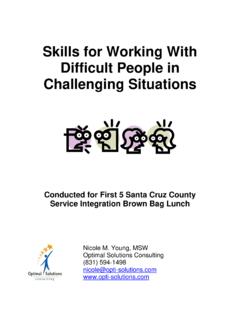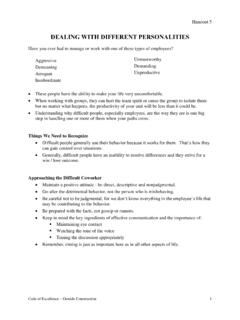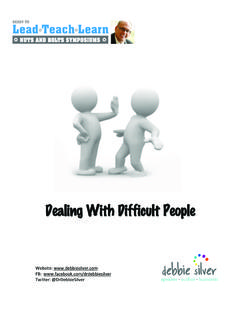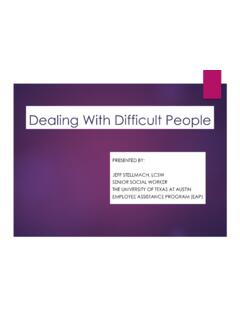Transcription of DEALING WITH DIFFICULT PEOPLE - coophousing.org
1 1 DEALING with DIFFICULT PEOPLE Jim is a real hands on Pr esid en t. (WHEN STRANGLING ISN T AN OPTION.) NAHC 2015 Co n f er en ce Kar en Br au n sch eid el, Nat io n al Ed u cat io n Man ag er Serving Michigan, Maryland, California, and Massachusetts 2 You might be a DIFFICULT person You have to stand on your head to smile. PEOPLE often tell you you re a DIFFICULT person. Your parrot only knows swear words. Your parents move and forget to tell you where. Milk curdles when you try to drink it. Your wife changes your home phone number while you re away on a trip. PEOPLE salute you on the job and you re not in the military. Your imaginary friends constantly tick you off. You often walk into businesses when they are coincidently closing. Somewhere, somehow, you get the feeling that nature is giving you the finger.
2 You go to work and find your desk has been moved to the cellar. To screw in a light bulb you stand there with the bulb in the socket and wait while the world revolves around you. Tele-marketers hang up on you. Someone keeps sending in your obituary to the paper. You really can break crystal with your normal speaking voice. Your ego wakes up before you do and has the coffee ready. The radio station actually plays songs just to annoy you. There is a collective groan when you walk into a board meeting. There is a collective groan when you walk into your co-op. The devil tells you to take it easy on PEOPLE . 3 MAIN POINT OF THIS WORKSHOP: Three DIFFICULT PEOPLE categories 1) Criminally DIFFICULT PEOPLE . 2) Unruly, screaming, swearing, rule breaking DIFFICULT PEOPLE .
3 3) Miserable, unhappy, bothersome DIFFICULT PEOPLE .. PERCEPTION, IT TAKES TWO The phrase DIFFICULT PEOPLE is a fundamentally relative expression. There is obviously a whole spectrum of behaviors that PEOPLE exhibit, along with a full spectrum of how those behaviors are perceived by the observer. For the purposes of this workshop, and more importantly for living in your Co-op, we will categorize DIFFICULT PEOPLE into three separate groups based on the severity and magnitude of those behaviors. OUR PART Research shows that supportive relationships are good for our mental and physical health. However, DEALING with DIFFICULT PEOPLE and maintaining ongoing negative relationships is actually detrimental to our health. Therefore, it s a good idea to diminish or eliminate relationships that are filled with conflict.
4 But what do you do if the person in question is a family member, co-worker, fellow co-op volunteer, or someone you otherwise can t easily eliminate from your life? 4 Confrontations and the progression of the event. Did you think about the confrontation, before, during and after? Let s go around the room and share our personal experiences. 1) What behavior did you observe, by someone who you would consider a DIFFICULT person, which upset you? 2) How did it make you feel? 3) How did you respond to the situation? 5 Don t give anyone free rent space in your head, happiness is an inside job , forgiveness is the key: I must forgive injuries, not just in words, or as a matter of form, but in my heart. I do this not for the other persons sake, but for my own sake.
5 Resentment, anger, or a desire to see someone punished, are things that rot my soul. Such things fasten my troubles to me with chains. They tie me to other problems that have nothing to do with my original problem . Author: Some wise person 6 Keep Conversations Neutral. Avoid discussing divisive and personal issues, like religion and politics, or other issues that tend to cause conflict. If the other person tries to engage you in a discussion that will probably become an argument, change the subject or leave the room. What are some neutral conversational topics? 1) _____ 2) _____ 3) _____ 4) _____ 5) _____ 7 Know What's Under Your Control. Change your response to the other person; this is all you have the power to change.
6 For example, don t feel you need to accept abusive behavior. You can use assertive communication to draw boundaries when the other person chooses to treat you in an unacceptable way. What are some assertive communication examples? 1) _____ 2) _____ 3) _____ 4) _____ 5) _____ 8 Look for similarities rather than differences. Choose to see the best in PEOPLE . Try to look for the positive aspects of others, especially when DEALING with fellow co-op members who you do not agree with . We all have differences and similarities; you can choose which aspects to focus upon. Finding common ground will help place you in the other person s shoes. What are some examples of good thinking choices? 1) _____ 2) _____ 3) _____ 4) _____ 5) _____ 9 Remember Who You're DEALING with Seeing the best in someone is important; however, don t pretend the other person s negative traits don t exist.
7 After all, if you were in a boxing match, you wouldn t lead with your chin. What are some examples of healthy interactions with PEOPLE , based on the shortcomings they might have? 1) _____ 2) _____ 3) _____ 4) _____ 5) _____ 10 MORE TIPS: Try not to place blame on yourself or the other person for the negative interactions. It may just be a case of your two personalities fitting poorly. Remember that you don't have to be close with everyone; just being polite goes a long way toward getting along and appropriately DEALING with DIFFICULT PEOPLE . Work to maintain a sense of humor -- difficulties will roll off your back much more easily. Shows like "Modern Family" and books like David Sedaris' Naked can help you see the humor in DEALING with DIFFICULT PEOPLE . Be sure to cultivate other more positive relationships in your life to offset the negativity of DEALING with DIFFICULT PEOPLE .
8 What if you know they don t like you? Always remember the following statement: It is none of your business what someone else thinks of you. Everyone is entitled to their own thoughts. 11 CONCLUSION So what was the whole point of this workshop? Some of us probably thought that it was how to change the DIFFICULT person. Well it turns out; the most effective way to deal with DIFFICULT PEOPLE is for us to understand our role, before during and after our encounter with the DIFFICULT person. We know now, It s all about how we react to the person rather than how the person treats us. 12 Attitude The longer I live, the more I realize the impact of attitude on life. Attitude, to me, is more important than facts. It is more important than the past, the education, the money, than circumstances, than failure, than successes, than what other PEOPLE think or say or do.
9 It is more important than appearance, giftedness or skill. It will make or break a a a home. The remarkable thing is we have a choice everyday regarding the attitude we will embrace for that day. We cannot change our we cannot change the fact that PEOPLE will act in a certain way. We cannot change the inevitable. The only thing we can do is play on the one string we have, and that is our attitude. I am convinced that life is 10% what happens to me and 90% of how I react to it. And so it is with we are in charge of our Attitudes. Charles R. Swindoll












